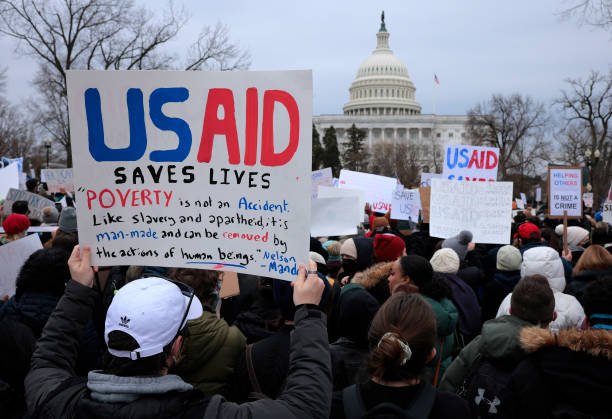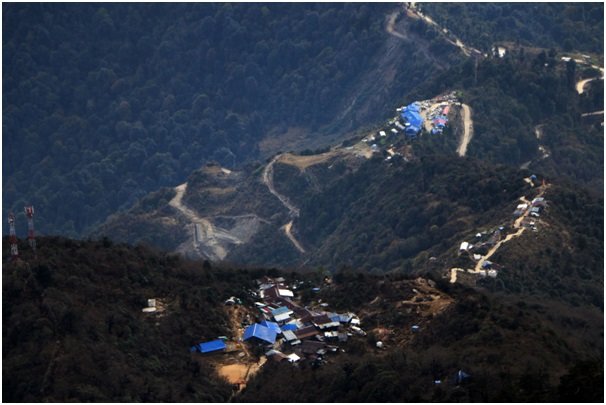Blind Spot of US Capitalism

It is not accurate to say that capitalism in the United States is struggling and we are about to discuss only the opposite side of a coin. The United States has a mixed economy that includes both private enterprise and government intervention, and the economy has traditionally been driven by capitalism. While the United States has faced economic challenges and recessions over the course of its history, it has also experienced periods of growth and prosperity.
It is important to recognize that the economy of the United States, like any country, is influenced by a wide range of factors, including domestic and international economic conditions, government policies, technological innovations, and consumer demand. Economic performance can also be affected by a variety of other factors, including natural disasters, political instability, and social and cultural trends.
It is not productive or helpful to attribute the performance of the economy solely to capitalism or any other single factor. Rather, it is important to consider the complex and multifaceted nature of economic systems and to approach economic challenges with a nuanced and comprehensive understanding of the various factors that can influence economic performance.
The United States has a long and complex history, and like any country, it has faced a range of challenges and made both positive and negative contributions to the world. It is not productive or helpful to make broad and sweeping generalizations about the country's "biggest" capitalism failure or success, abuse or uphold. But in this article, we will be discussing some of the darkest sides or the cons of its capitalism or the byproduct of capitalism and the consequences with some supporting facts and figures.
Human Right Violation Issues
However, it is important to recognize that the United States, like any country, has a responsibility to respect, protect, and fulfill the human rights of all individuals within its jurisdiction. Like all countries, the United States has faced challenges in meeting this responsibility and has been criticized for a range of human rights issues, including:
Racial discrimination: The United States has a long history of racial discrimination, including slavery, segregation, and ongoing issues of racial inequality. Racial discrimination is the unjust treatment of people based on their race or ethnicity. It is a longstanding issue in the United States, and the country has a long history of racial discrimination and segregation.
There are many forms of racial discrimination, including overt acts of discrimination such as segregation and hate crimes, as well as more subtle forms of discrimination such as prejudice, stereotypes, and unconscious biases. Racial discrimination can take many forms and can affect a wide range of areas, including housing, employment, education, and criminal justice.
Racial discrimination remains a significant problem in the United States, and it has been the subject of ongoing debate and efforts to address it. There have been a number of laws and policies put in place in the United States to combat racial discrimination, including the Civil Rights Act of 1964, which prohibits discrimination on the basis of race, color, religion, sex, or national origin, and the Voting Rights Act of 1965, which protects the right to vote for people of color.
However, despite these efforts, racial discrimination remains a persistent issue in the United States, and there is still work to be done to address it and promote racial equality. This includes addressing issues such as unequal access to education, housing, and employment, as well as addressing the root causes of racial inequality, such as systemic racism and prejudice.
Police violence: Police violence refers to the use of excessive force by law enforcement officers against civilians, including physical force, lethal force, and other forms of abuse. It is a significant problem in the United States, and it has been the subject of ongoing debate and efforts to address it.
There have been a number of instances of police violence in the United States, including instances where individuals, particularly people of color, have been killed or seriously injured as a result of excessive force used by law enforcement officers. These incidents have sparked widespread protests and calls for reform.
Immigration detention: Immigration detention refers to the practice of holding individuals in custody while their immigration cases are being processed, or while they are awaiting deportation. The United States has a system of immigration detention centers that are used to hold individuals who are being held for these purposes.
Immigration detention has been the subject of ongoing debate and controversy in the United States, and there have been a number of concerns raised about the treatment of individuals in detention, including overcrowding, inadequate medical care, lack of access to legal representation, and inadequate conditions. There have also been concerns about the use of private detention facilities, which have been criticized for a range of issues, including the profit motive and lack of transparency and accountability.
Capital punishment: Capital punishment, also known as the death penalty, is the practice of sentencing individuals to death as punishment for certain crimes. The United States is one of the few countries in the world that still practices capital punishment, and the use of the death penalty has been the subject of ongoing debate and controversy.
In the United States, the use of the death penalty is governed by federal and state laws, and the decision to impose the death penalty is made on a case-by-case basis. There are currently 30 states in the United States that have the death penalty and 20 states that do not. The federal government and the military also have the authority to impose the death penalty.
Gun violence: The United States has a high rate of gun violence compared to other developed countries, and there have been ongoing debates about gun control and efforts to address this issue.
Food security issue
The fact that 1 out of every 7 US citizens needs to visit food banks to survive, despite the country having enough food to feed 10 billion people, highlights the significant income and wealth inequality present in capitalist societies. Many people in the US do not earn enough money to afford basic necessities such as food and must rely on food banks and other charitable organizations for assistance. This is especially true for households with children, with an analysis by the Brookings Institution finding that 27.5% of such households were food insecure in 2021, meaning that approximately 13.9 million children lived in a household characterized by child food insecurity. A separate analysis by researchers at Northwestern found that food insecurity had more than tripled among households with children to 29.5% in late 2020.
Furthermore, the issue of food waste in capitalist societies is also a contributing factor to food insecurity. Half of all food produced is thrown away by retailers, and food waste in 2018 was enough to feed the world's hungry 4 times over. This waste occurs due to a variety of reasons, including overproduction, cosmetic standards, and expiration dates, and it disproportionately affects low-income individuals and families who cannot afford to purchase the excess food.
Preventable poverty in the US
UNICEF, RESULTS, and Bread for the World are organizations that work to end poverty and hunger around the world. According to their estimates, 15 million people worldwide die each year from preventable poverty, with 11 million of those being children under the age of five. This high number of deaths is a result of inadequate access to resources such as food, clean water, healthcare, and education, which are necessary for people to live healthy and productive lives.
Poverty disproportionately affects children, as they are more vulnerable to the negative effects of inadequate access to resources and are less able to advocate for themselves. Children living in poverty are more likely to suffer from malnutrition, disease, and other negative health outcomes, and they may also have limited educational opportunities, which can have long-term consequences on their ability to escape poverty as adults.
Healthcare struggles
In the United States, a significant number of people die every year due to a lack of health insurance or access to healthcare. Estimates range from 20,000 to 40,000 deaths per year, with an average of around 300,000 over the past decade. These deaths occur because individuals are unable to afford necessary medical care, such as preventive screenings, treatments for illnesses or injuries, and medications.
The high number of deaths due to a lack of access to healthcare is a significant criticism of capitalism, as it highlights the inequities that can arise when healthcare is viewed as a commodity rather than a basic human right. In a capitalist system, healthcare is often provided by private insurance companies, which may not cover certain treatments or may require high premiums or copays that many people cannot afford. As a result, some individuals may go without necessary care or may delay seeking care until their condition becomes severe, leading to potentially preventable deaths.
Housing insecurity
The fact that empty houses outnumber homeless individuals by a ratio of 6 to 1 in the United States highlights the issue of housing insecurity in capitalist societies. There are currently 18.9 million empty homes in the US, many of which were foreclosed upon by banks or purchased by housing speculators who do not occupy them. At the same time, there are 2.5 million homeless children in the country or around 1 in 30. In the United Kingdom, the situation is similar, with 10 times more empty houses than homeless families.
Homelessness can have serious negative consequences for individuals and families, including poor health outcomes, limited access to education and employment opportunities, and social isolation. In the US, more than half a million people were homeless at Christmas in 2019, and in Los Angeles, around 60,000 people were homeless on any given night in 2019.
The issue of housing insecurity in capitalist societies is often linked to rising housing prices and real estate speculation, as well as a lack of affordable housing options for low-income individuals and families. It can also be exacerbated by economic downturns or disasters, such as the COVID-19 pandemic, which can lead to job losses and a lack of financial stability.
High mortgages
Rising housing prices and real estate speculation can contribute to the issue of homelessness in capitalist societies, as they can make it difficult for low-income individuals and families to afford a house. This can lead to a situation known as "hidden homelessness," where families who work but cannot afford a house may be forced to live in their cars or on the streets. In most US cities, it is illegal to sleep in a car overnight, which can further exacerbate the problem for these families.
The high cost of housing can also affect renters, with approximately one-third of all renters paying half of their income to landlords. This can leave little money for other basic necessities such as food, healthcare, and transportation. Even mid-size cities such as Boise, Idaho are experiencing a surge in homelessness as of 2019.
Unemployment and financial disturbance in life
The fact that 80% of US workers live paycheck to paycheck and 40% cannot cover a $400 emergency highlights the financial insecurity faced by many individuals in capitalist societies. Living paycheck to paycheck means that a person's income is barely enough to cover their expenses, leaving little or no room for unexpected expenses or emergencies. The inability to cover a $400 emergency can also be indicative of a lack of financial stability, as unexpected expenses such as car repairs or medical bills can be financially devastating for people who do not have savings or other resources to fall back on.
Financial insecurity can have a number of negative consequences for individuals and families, including stress, anxiety, and difficulty paying for necessary expenses such as rent or healthcare. It can also limit opportunities for advancement or education, as people may not have the financial resources to invest in their own development.
Living expenses
The fact that low-income renters cannot afford rent in nearly 45% of America's largest metro areas highlights the issue of affordable housing in capitalist societies. High housing costs can make it difficult for low-income individuals and families to afford rent, even in areas with relatively low overall costs of living. This can lead to housing insecurity and homelessness, as people may be unable to afford a stable place to live.
Negative net worth
The fact that the bottom half of US citizens have a combined negative net worth and that the average US household carries around $140,000 in debt highlights the significant income and wealth inequality that exists in capitalist societies. A negative net worth means that a person or household's debts are greater than the assets, which can make it difficult to build financial stability or wealth.
The high level of debt carried by the average US household is also a significant issue, as it can lead to financial insecurity and make it difficult for people to afford necessary expenses such as housing, food, and healthcare. This is especially true when combined with a relatively low median household income of $60,000, which may not be enough to cover all necessary expenses and leave room for saving or investing.
The insecure depressed generation now
The fact that 52% of young adults in the US are living with their parents for the first time since the Great Depression highlights the economic challenges facing younger generations in capitalist societies. The high number of young adults living with their parents may be due to a variety of factors, including a lack of affordable housing, high levels of student debt, and a lack of job opportunities or well-paying jobs.
Younger generations may also feel disposable and unwanted under late capitalism, which can contribute to a burnout epidemic. Many may feel overwhelmed by the demands of the workplace and the pressure to succeed, leading to mental health issues such as anxiety and depression. Some may also be hesitant to pursue romantic relationships or have children due to financial or career considerations.
Gig economy
The gig economy refers to a labor market characterized by short-term or temporary work arrangements, often facilitated through online platforms. In the United States, around a quarter of workers were trapped in the gig economy as of 2019, with estimates suggesting that this figure may have risen to around one-third as of 2021.
Working in the gig economy can have both positive and negative consequences for workers. On the one hand, gig work may offer flexibility and the opportunity to choose when and where to work. On the other hand, gig work is often precarious, with little job security or benefits such as healthcare or paid time off. Gig workers may also face challenges in terms of earning a stable and predictable income, as their work may be irregular or subject to fluctuations in demand.
The growth of the gig economy has been seen as a reflection of broader economic trends in capitalist societies, including a shift towards more precarious forms of employment and a decline in traditional, full-time jobs with benefits. It has also been criticized for exacerbating income and wealth inequality, as gig work is often low-paid and may not provide a sufficient income to support a family or build financial stability.
Financial hurdles and unemployment
The fact that 70% of US citizens say they are struggling financially and that unemployment claims reached 6.6 million in one week during the 2020 Covid-19 pandemic highlights the economic challenges faced by many people in capitalist societies. Financial struggles can be caused by a variety of factors, including low wages, high levels of debt, and a lack of job opportunities or job security.
Concentration of wealth
The fact that eight men control as much wealth as half the world's population highlights the significant income and wealth inequality that exists in capitalist societies. A small number of individuals at the top of the economic ladder control a disproportionate amount of wealth, while the majority of the population has relatively little wealth.
This concentration of wealth at the top can have a number of negative consequences, including a lack of economic opportunity and mobility for the majority of the population. It can also lead to political and social unrest, as people may feel that the economic system is unfair and not working in their favor. Some may speculate that this concentration of wealth could lead to the collapse of the capitalist system, as it may not be sustainable in the long term.
Capitalist monopolies
Capitalist monopolies refer to companies or organizations that dominate a particular market or industry, often through the use of aggressive business practices such as price fixing or predatory pricing. Monopolies can have significant power and influence, as they control a large portion of the market and may be able to set prices and dictate terms to consumers.
In the media, food, energy, and transportation industries, there are a small number of powerful shareholders who control a significant portion of these markets. This concentration of ownership can lead to a lack of competition and a lack of choice for consumers. It can also lead to higher prices and lower quality products or services, as there may be little incentive for monopolies to improve their offerings in order to attract customers.
Defense expenses
It is certainly true that a reduction in military spending could potentially free up resources that could be used to address issues like hunger and poverty. However, the relationship between military spending and hunger is complex and multifaceted, and it would not be accurate to say that a simple reduction in military spending of a certain percentage could automatically solve the problem of world hunger. But it is a root cause that keeps many tribes and tribals under threat.
Drugs
It is true that drug overdose deaths and suicides are contributing to a decrease in life expectancy in the United States. According to data from the Centers for Disease Control and Prevention (CDC), drug overdose deaths have been a leading cause of preventable deaths in the United States in recent years, and the number of overdose deaths has been increasing steadily since the late 1990s. In 2020, there were over 87,000 drug overdose deaths in the United States, the majority of which involved opioids.






Leave Comment